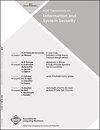在不依赖https的情况下撤销反复行为不端的匿名用户
Q Engineering
ACM Transactions on Information and System Security
Pub Date : 2010-12-01
DOI:10.1145/1880022.1880033
引用次数: 55
摘要
已经提出了几种证书系统,其中用户可以匿名向服务提供者进行身份验证。由于匿名可以给用户不当行为的许可,一些变体允许在向可信第三方(TTP)投诉时选择性地对行为不当的用户进行去匿名化(或链接)。然而,TTP在任何时候撤销用户隐私的能力对不当行为的惩罚太过强烈。为了限制去匿名化的范围,已经提出了一些系统,在这些系统中,用户只有在“太多次”验证时才能被去匿名化,例如使用电子现金的“双重支出”。虽然在某些应用程序中很有用,但这种技术不能推广到对不当行为的更主观的定义,例如,使用这种方案不可能阻止在Web站点上“破坏太多Web页面”的匿名用户。我们提出了BLAC,这是第一个匿名凭证系统,服务提供商可以在不依赖于http的情况下撤销行为不端的用户的凭证。由于被撤销的用户仍然是匿名的,用户可以主观地判断不当行为,而不必担心被http任意去匿名化。此外,我们的结构支持d-strikes-out撤销策略,即主观上被判断为多次违规行为至少d次的用户将被从系统中撤销。因此,使用我们的方案,第一次确实有可能阻止那些“破坏了太多网页”的匿名用户。本文章由计算机程序翻译,如有差异,请以英文原文为准。
BLAC: Revoking Repeatedly Misbehaving Anonymous Users without Relying on TTPs
Several credential systems have been proposed in which users can authenticate to service providers anonymously. Since anonymity can give users the license to misbehave, some variants allow the selective deanonymization (or linking) of misbehaving users upon a complaint to a Trusted Third Party (TTP). The ability of the TTP to revoke a user’s privacy at any time, however, is too strong a punishment for misbehavior. To limit the scope of deanonymization, some systems have been proposed in which users can be deanonymized only if they authenticate “too many times,” such as “double spending” with electronic cash. While useful in some applications, such techniques cannot be generalized to more subjective definitions of misbehavior, for example, using such schemes it is not possible to block anonymous users who “deface too many Web pages” on a Web site.
We present BLAC, the first anonymous credential system in which service providers can revoke the credentials of misbehaving users without relying on a TTP . Since revoked users remain anonymous, misbehaviors can be judged subjectively without users fearing arbitrary deanonymization by a TTP . Additionally, our construction supports a d-strikes-out revocation policy, whereby users who have been subjectively judged to have repeatedly misbehaved at least d times are revoked from the system. Thus, for the first time, it is indeed possible to block anonymous users who have “defaced too many Web pages” using our scheme.
求助全文
通过发布文献求助,成功后即可免费获取论文全文。
去求助
来源期刊

ACM Transactions on Information and System Security
工程技术-计算机:信息系统
CiteScore
4.50
自引率
0.00%
发文量
0
审稿时长
3.3 months
期刊介绍:
ISSEC is a scholarly, scientific journal that publishes original research papers in all areas of information and system security, including technologies, systems, applications, and policies.
 求助内容:
求助内容: 应助结果提醒方式:
应助结果提醒方式:


